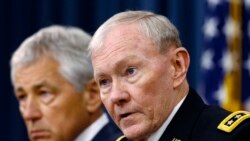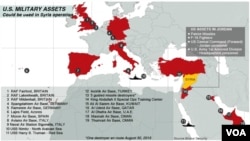PENTAGON —
With destroyers and other assets positioned to strike Syria, U.S. military leaders have laid out their goals if there is an attack. Officials are weighing the scenarios that could follow the first shot.
The U.S. aim is to weaken Syria's defenses enough to eventually bring about the negotiated departure of Bashar al-Assad.
General Martin Dempsey, chairman of the Joint Chiefs of Staff, told senators the proportionate and limited strike that he would be in charge of would be a first step.
“To deter, that is to say change the regime’s calculus about thee use of chemical weapons, and degrade his ability to do so,” he said.
To do that, the U.S. has Tomahawk missiles ready to hit Syrian government targets. About 40 of the missiles are aboard each of four destroyers that are deployed to the eastern Mediterranean.
The U.S. has doubled the number of vessels in the region. The Nimitz aircraft carrier group is nearby in the Red Sea, ready to be called into action.
The administration rules out wider action for now. But observers say, once the United States fires the first missile, Washington becomes a participant in Syria's civil war, and a promise to stay out of the conflict becomes difficult to keep.
“Right now we are denying that we want to overthrow the regime, but the fact is when you are bombing targets, government targets in Syria, and there are rebels trying to overthrow the government, you are, whether you say it or not, trying to overthrow the government. But you're only doing it a little bit,” said Cato analyst Benjamin Friedman.
If Syria's chemical weapons were to fall into the hands of militants or if there were complete chaos, Secretary of State John Kerry told Senators he would want the president to have the option of putting U.S. troops on the ground, but he added, quickly, that was only a hypothetical statement.
A strike could last a few hours or a few days, but Pentagon planners are ready for possible wider consequences.
U.S. forces have little to expect in terms of a response from Syria's comparatively weak military. They would watch for a possible retaliation by Iran-backed Hezbollah and other militant groups that could launch attacks against Israel and other U.S. allies in the region.
The U.S. aim is to weaken Syria's defenses enough to eventually bring about the negotiated departure of Bashar al-Assad.
General Martin Dempsey, chairman of the Joint Chiefs of Staff, told senators the proportionate and limited strike that he would be in charge of would be a first step.
“To deter, that is to say change the regime’s calculus about thee use of chemical weapons, and degrade his ability to do so,” he said.
To do that, the U.S. has Tomahawk missiles ready to hit Syrian government targets. About 40 of the missiles are aboard each of four destroyers that are deployed to the eastern Mediterranean.
The U.S. has doubled the number of vessels in the region. The Nimitz aircraft carrier group is nearby in the Red Sea, ready to be called into action.
The administration rules out wider action for now. But observers say, once the United States fires the first missile, Washington becomes a participant in Syria's civil war, and a promise to stay out of the conflict becomes difficult to keep.
“Right now we are denying that we want to overthrow the regime, but the fact is when you are bombing targets, government targets in Syria, and there are rebels trying to overthrow the government, you are, whether you say it or not, trying to overthrow the government. But you're only doing it a little bit,” said Cato analyst Benjamin Friedman.
If Syria's chemical weapons were to fall into the hands of militants or if there were complete chaos, Secretary of State John Kerry told Senators he would want the president to have the option of putting U.S. troops on the ground, but he added, quickly, that was only a hypothetical statement.
A strike could last a few hours or a few days, but Pentagon planners are ready for possible wider consequences.
U.S. forces have little to expect in terms of a response from Syria's comparatively weak military. They would watch for a possible retaliation by Iran-backed Hezbollah and other militant groups that could launch attacks against Israel and other U.S. allies in the region.






